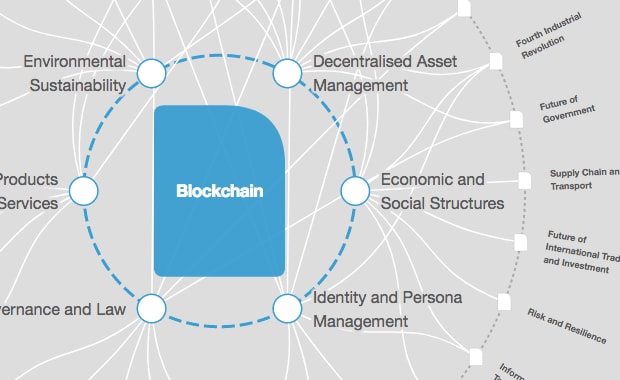Will 2020 be the year blockchain overcomes its hype?

It will have to transform from buzzword to business. Image: Clint Adair/Unsplash
- In 2019, the focus on blockchain shifted from hype to quality.
- In 2020, there is an opportunity for blockchain to have a social impact.
- But projects will only succeed if there is adequate governance and a collaborative approach.
Another year has rolled on by, and while many things in the blockchain space have changed, a lot remains the same. 2019 saw a continued cooling of indiscriminate funding and a renewed focus on quality over hype. In addition, we’ve seen the acknowledgement by some big names, including Facebook and the other Libra Association members, and even a few central banks, that blockchain technology, and digital currency, are truly exciting innovations that just need a bit more experimentation to stick.
At the World Economic Forum, we’re keen to ensure that greater blockchain adoption, which we deem inevitable, happens in ways that support inclusion and avoid replicating the consolidation of power that currently exists, particularly in the financial system. In addition, we remain focused on rationalizing this technology across sectors and publicizing our learnings in an effort to guide the public sector and civil society knowledge, funding, and robust experiments.

To go far, go together
Last year, we saw less of established actors pitching competitors on unilateral projects. Instead, we saw either totally internal initiatives or creative attempts at consortium building (for example, Food Trust, Tradelens, INATBA, Libra), with varying degrees of success. Companies are waking up to the idea that to go far, they ought to go together. (As an example, the Forum recently launched a consortium to explore the use of blockchain technology in the mining and metals sector, where a collaborative approach would have been hard to imagine even a few years ago).
We expect to see a similar collaborative approach from the public sector as 2020 progresses, and in fact, the Forum has already seen an increased willingness on the part of public sector agencies to share learnings and challenges. (An example is our Central Banks Digital Currency project, which has brought together more than 45 Central Banks to explore parameters for successful deployment of a CBDC. Our CBDC Policymaker Toolkit, co-created with over 45 Central Banks, will launch in Davos at our Annual Meeting.)
Devil in the details
The term “governance” used to cause immediate recoil among even blockchain enthusiasts. But 2019 saw a gradual recognition (or perhaps resignation) that governance is a feature that drives adoption.
Of course, as Facebook learned, the promise or potential for good governance is not enough; the devil is in the details, and 2019 saw laypeople diving deep into the specifics of operations, business models, and legal structures in an effort to assess risk. That was also reflected in regulators’ investigations in the 2017-2018 slate of ICOs, exemplifying the importance of specifics (despite the lack of clarity that continues to cloud the regulatory space globally).
Social impact
At the Forum, we’re focused on bringing together stakeholders to pilot policy projects focused on social impact. The social impact space continues in an ongoing, and frustrating, attempt to remedy complex societal problems with technical solutions. Our view, which is informed by the previous generation of tech experimentation, is that technology alone simply cannot adequately address social challenges, and that accompanying policy is essential to ensure that a blockchain, or really any technology, is deployed in a way that addresses its limitations.
Celo, a payments startup, is a good example of a team that understands cultural and social realities and its baking that learning into its user experience. Another example is AZA Group (aka Bitpesa), with its deep knowledge of frontier markets, particularly in Africa.
In a similar vein, our government transparency project, which focuses on aligning civic engagement with a blockchain deployment designed to reduce corruption in public procurement, will pilot in Colombia in early 2020 and looks to develop local talent needed to maintain deployment over time and avoid vendor dependency.
We are seeing increased understanding that blockchain technology is not exempt from the need for robust understanding of context. This is a welcome change from the insanity of 2018, when merely adding the word “blockchain” to a pitch was enough to claim authenticity.
Of course, there is still a long way to go. The reality is that the most transformative applications of blockchain technology are arguably best-suited to the most challenging contexts (for example, “banking the unbanked” is a deeply complex problem that can’t be solved by simply rolling out a token), and we are still a long way from realizing the true potential of this technology in the social impact space.
Whither 2020?
This year, we expect to see increased experimentation with hybrid blockchain models, both in the financial sector (for example, decentralized finance or DeFi and “synthetic” CBDCs) and the public sector (increased use of smart contracts). These are a great way to increase comfort with the technology.
We are not close to realizing the promise of truly decentralized systems, but the space continues to evolve in exciting new ways, and it’s just a matter of time before something huge gains traction.
This article originally appeared on CoinDesk.
Don't miss any update on this topic
Create a free account and access your personalized content collection with our latest publications and analyses.
License and Republishing
World Economic Forum articles may be republished in accordance with the Creative Commons Attribution-NonCommercial-NoDerivatives 4.0 International Public License, and in accordance with our Terms of Use.
The views expressed in this article are those of the author alone and not the World Economic Forum.
Stay up to date:
Blockchain
Related topics:
Forum Stories newsletter
Bringing you weekly curated insights and analysis on the global issues that matter.






